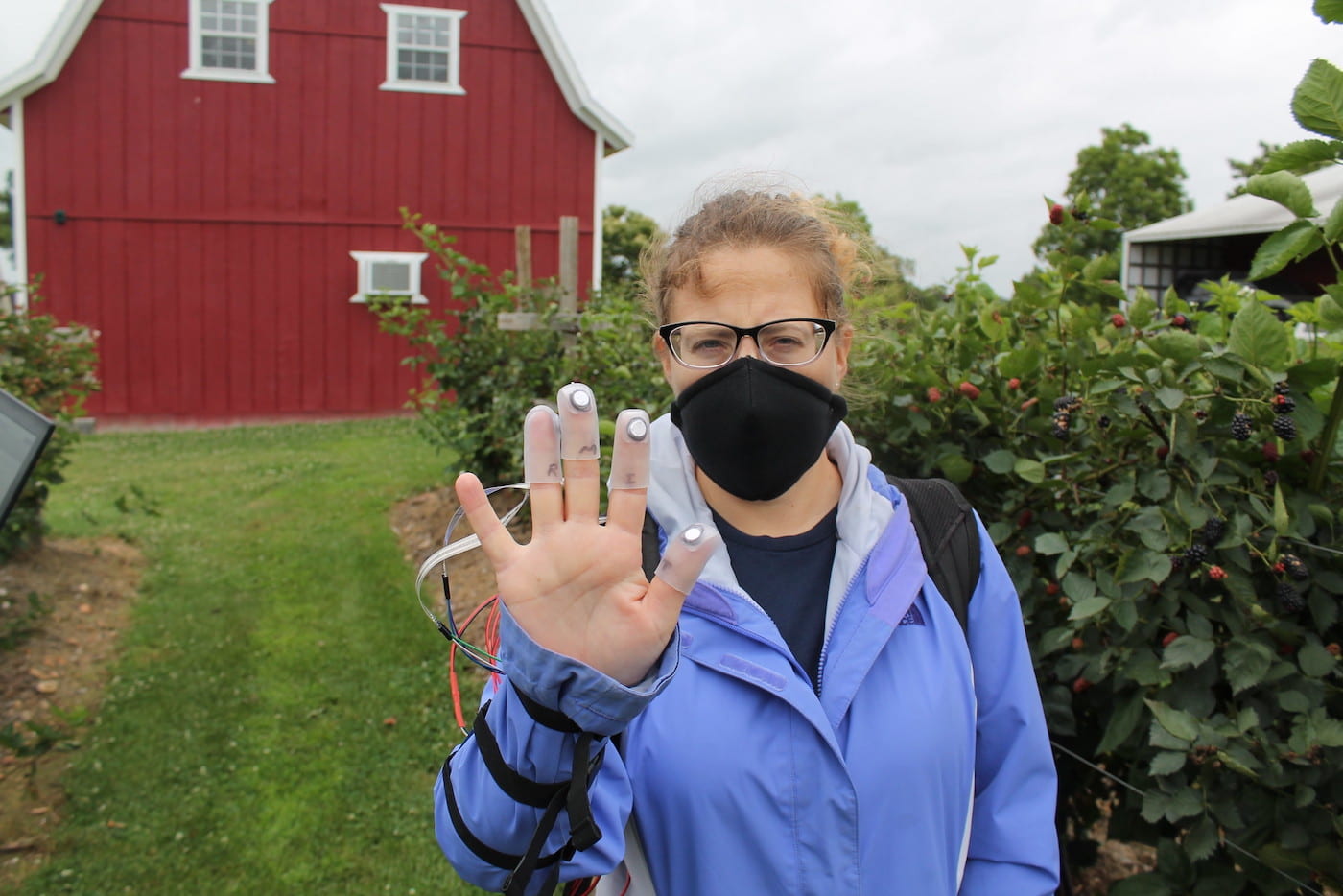Building a Robotic Hand to Pick Blackberries

Fresh market blackberries are a delicate fruit that must be hand-picked. As labor becomes increasingly difficult to come by, scientists have adapted the use of “soft robotics” to create a robotic hand that can pick blackberries without damaging the fruit. The results of their work show the potential for the blackberry industry to one day use robotics to decrease labor costs and harvest time.
The Problem
Labor is among the biggest expenses U.S. fruit growers face — 39 percent of production costs for fruit and tree nut operations — and farm wages are rising at a faster rate than non-farm wages, according to the U.S. Department of Agriculture Economic Research Service. Mechanization is one strategy to adjust to the changing market and can be a solution to possible labor shortages. But blackberries are a delicate fruit that require more precision than traditional mechanical harvesters.
The Work
Researchers with the Arkansas Agricultural Experiment Station collaborated with scientists in the University of Arkansas mechanical engineering department to develop a soft robotic hand that can pick blackberries. Before the robotic hand could be developed, researchers had to establish the force parameters to pick blackberries by hand. A glove with silicone finger sleeves and biometric sensors attached to the fingertips was created to measure the force required to pick a blackberry. Renee Threlfall, food science research scientist with the experiment station, worked with Yue Chen, then assistant professor in the biomedical engineering department to develop the finger sleeves. Andrea L. Myers, the lead author of the publication and then a food science graduate student at the University of Arkansas, tested the biometrics with Anthony Gunderman, then a doctoral student in mechanical engineering at the University of Arkansas. Chen is now an assistant professor in the biomedical engineering department at the Georgia Institute of Technology and Emory University. Gunderman is a Ph.D. student in robotics at Georgia Tech’s Institute for Robotics and Intelligent Machines.
Based on the results of the biometrics, the researchers developed a three-pronged, soft robotic gripper and tested its capabilities of harvesting blackberries.
The Results
Research from the first phase showed that one half of 1 Newton was the force required to pluck a blackberry without damaging it. 1 Newton is equal to the effort required to lift a small object like an apple or a candy bar. The first phase of the study also showed that only three appendages were necessary, instead of four, to harvest a blackberry. This guided the development of the three-pronged silicone gripper in the second phase of the work.
The forces applied to grab, stabilize and harvest the blackberries with the gripper did not cause excessive damage after cold storage for 21 days. However, the fruit harvested with the gripper in 2021 had 11 percent more leakage and 7 percent more red drupelet reversion — when the individual round segments on the blackberry turn from black back to red — than fruit harvested by hand. Field tests also showed the robotic gripper was capable of harvesting berries at about 5 seconds per berry.
The Value
Global berry production and consumption have significantly increased in recent years, coinciding with increased consumer awareness of the health-promoting benefits of berries. Manual harvesting is a costly endeavor that accounts for more than one-third of the person-hours involved in berry production. With the increase in demand, and potential for increasing agriculture sector labor shortages in the future, this research will help improve mechanical harvesting of this delicate fruit through soft robotics.
Read the Research
Determining Hand-harvest Parameters and Postharvest Marketability Impacts of Fresh-market Blackberries to Develop a Soft-robotic Gripper for Robotic Harvesting
HortScience
Volume 57, Issue 5 (2022)
https://doi.org/10.21273/HORTSCI16487-22
Tendon-Driven Soft Robotic Gripper for Blackberry Harvesting
IEEE Robotics and Automation Letters
Volume 7, Issue 2 (2022)
https://doi.org/10.1109/LRA.2022.3143891
Supported in part by
The University of Arkansas Chancellor’s Innovation and Collaboration Fund and a Specialty Crop Block Grant awarded by the Arkansas Department of Agriculture.
About the Researcher
Read the Research
Determining Hand-harvest Parameters and Postharvest Marketability Impacts of Fresh-market Blackberries to Develop a Soft-robotic Gripper for Robotic Harvesting
HortScience
Volume 57, Issue 5 (2022)
https://doi.org/10.21273/HORTSCI16487-22
Tendon-Driven Soft Robotic Gripper for Blackberry Harvesting
IEEE Robotics and Automation Letters
Volume 7, Issue 2 (2022)
https://doi.org/10.1109/LRA.2022.3143891
Supported in part by
The University of Arkansas Chancellor’s Innovation and Collaboration Fund and a Specialty Crop Block Grant awarded by the Arkansas Department of Agriculture.

Renee Threlfall
Research scientist in enology and viticulture
Ph.D., Food Science, University of Arkansas, Fayetteville
M.S., Food Science, University of Arkansas, Fayetteville
B.S., Food Science, University of Arkansas, Fayetteville
Andrea L. Myers
Program technician
M.S., Food Science, University of Arkansas, Fayetteville
B.S., Food Science, Culinary Science, University of Arkansas, Fayetteville




